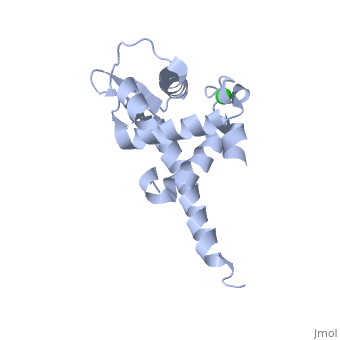Ribosomal protein S19
From Proteopedia
(Difference between revisions)
| Line 1: | Line 1: | ||
| - | + | ||
| + | <StructureSection load='2v7f' size='350' side='right' scene='' caption='Ribosomal protein S19 complex with Cl- ion (PDB code [[2v7f]])'> | ||
== Function == | == Function == | ||
[[Ribosomal protein S19]] (RPS19) is one of the 21 proteins which belong to the 30S <scene name='Ribosomal_protein_S19/Cv/2'>small subunit</scene> of the [http://en.wikipedia.org/wiki/Bacteria bacterial] [[ribosome]] or the 30 proteins which belong to the 40S small subunit of the eukaryotic ribosome. It forms a complex with RPS13 that binds to 16S RRNA<ref>PMID:8722009</ref>. | [[Ribosomal protein S19]] (RPS19) is one of the 21 proteins which belong to the 30S <scene name='Ribosomal_protein_S19/Cv/2'>small subunit</scene> of the [http://en.wikipedia.org/wiki/Bacteria bacterial] [[ribosome]] or the 30 proteins which belong to the 40S small subunit of the eukaryotic ribosome. It forms a complex with RPS13 that binds to 16S RRNA<ref>PMID:8722009</ref>. | ||
| Line 5: | Line 6: | ||
== Relevance == | == Relevance == | ||
RPS19 is a potent anti-inflammatory agent which appears to work primarily by inhibiting MIF signaling<ref>PMID:23252627</ref>. | RPS19 is a potent anti-inflammatory agent which appears to work primarily by inhibiting MIF signaling<ref>PMID:23252627</ref>. | ||
| + | </StructureSection> | ||
== 3D Structures of Ribosomal protein S19 == | == 3D Structures of Ribosomal protein S19 == | ||
Revision as of 20:47, 29 September 2017
| |||||||||||
3D Structures of Ribosomal protein S19
Updated on 29-September-2017
2v7f – RPS19 – Pyroccocus abyssi
1qkh, 1qkf - TtRPS19 - Thermus thermophilus – NMR
3a1p – TtRPS19 + ribosome maturation factor
References
- ↑ Wool IG, Chan YL, Gluck A. Structure and evolution of mammalian ribosomal proteins. Biochem Cell Biol. 1995 Nov-Dec;73(11-12):933-47. PMID:8722009
- ↑ Lv J, Huang XR, Klug J, Frohlich S, Lacher P, Xu A, Meinhardt A, Lan HY. Ribosomal protein S19 is a novel therapeutic agent in inflammatory kidney disease. Clin Sci (Lond). 2013 May;124(10):627-37. doi: 10.1042/CS20120526. PMID:23252627 doi:http://dx.doi.org/10.1042/CS20120526

